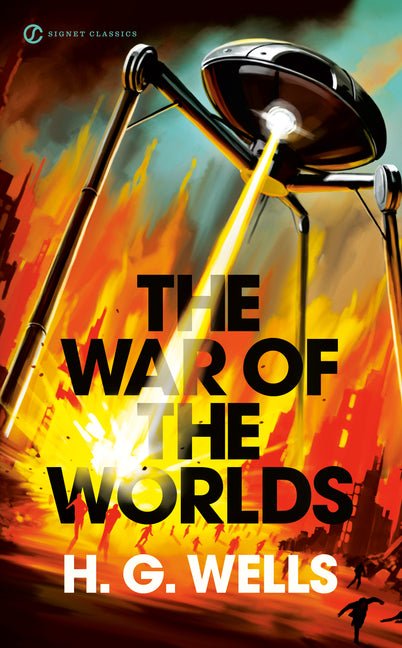The War of the Worlds
by H G Wells
*When you open this audiobook on Libro.fm, be sure to select Aveson as your bookstore so that your purchase supports local literacy programs and tree‑planting.
Couldn't load pickup availability
For more than one hundred years H. G. Wells’ classic science fiction tale of the Martian invasion of Earth has enthralled readers with a combination of imagination and incisive commentary on the imbalance of power that continues to be relevant today.
No one would have believed in the last years of the nineteenth century that this world was being watched keenly and closely by intelligences greater than man’s and yet as mortal as his own....
So begins The War of the Worlds, the science fiction classic that first proposed the possibility of intelligent life on other planets and has enthralled readers for generations. This compelling tale describes the Martian invasion of earth. When huge, tireless creatures land in England, complete chaos erupts. Using their fiery heat rays and crushing strength, the aliens just may succeed in silencing all opposition. Is life on earth doomed? Will mankind survive? A timeless view of a universe turned upside down, The War of the Worlds is an ingenious and imaginative look into the possibilities of the future and the secrets yet to be revealed.
WITH AN INTRODUCTION BY KARL KROEBER AND AN AFTERWORD BY ISAAC ASIMOV
Share
Book Details
ISBN:
9780451530653
EAN:
0451530659
Binding:
Mass Market Paperbound
Pages:
224
Authors:
H G Wells
Publisher:
Signet Book

Well worth the read. I've always loved the Tom Cruise modern version of this story, but after reading this I feel dead set that they need to make a new prequel. Great classic, highly enjoyed.
Great book, had to read it a second time.
Required school book. Book was good quality and he enjoyed reading it.
This is my son's favorite book!
"The War of the Worlds" is today best remembered as the radio drama that helped launch a different Wells's career, but originally it was a short science-fiction novel published serially in a newspaper in Victorian Britain. This outdated setting is mostly forgotten today, but it's well worth reading the story in its original form to get a real sense for just how groundbreaking and revolutionary it was.This is the originator of the "alien invasion" story, based loosely on then-popular tales of the Germans invading Britain but with a unique, far more dangerous and terrifying enemy. The Martians never communicate with humans. We can only infer their intentions and motivations. Mostly they just kill -- with a ray of intense heat (lasers having not been invented yet), poisonous black smoke (decades before World War I) and giant tripod machines that tower over the tranquil English landscape. We also find out later that they have a direct, skin-crawling interest in humans themselves. The Brits put up a valiant defense (artillery, torpedo boats), but mostly this is a refugee story, of terrified civilians fleeing for their lives, looting abandoned houses and losing their minds as they grapple with the hopelessness of their struggle.Wells's prose isn't spectacular, but it gets the job done and we never have to scratch our heads, wondering what he's writing about. If I could make one nitpick, it's that the subplot about the narrator's brother and two women he joins with is never resolved. Otherwise, it's a visceral story about humanity pushed to its limits, forced to cope with an alien force it can barely comprehend, much less resist. It's strikingly modern -- the Martians are tentacled heads the size of bears instead of funny-colored humans, the government plays down the magnitude of the impending menace until the very last minute, the descriptions of terrified refugees and the raving curate feel like something out of the 1900s' real disasters. And for its time, Wells's parable -- this is mostly an allegory for how Europeans treated the rest of the world in the age of imperialism -- was strikingly prescient. Mars may not be capable of hosting life and the idea of aliens reaching Earth through "cylinders" fired from guns may be quaint, but this is still a horrifying, gripping story of the worst-case scenario for an alien encounter, relevant over a century later.



